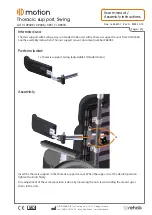
Remploy
8 & 9 Series
User Guide
Page
8
September 2006 Revision D
1.4
BRAKES
Hand brakes are provided for preventing wheel movement when parked,
particularly on a slope, or during occupant transfer to and from the
wheelchair. The action of a brake shoe pressing on the tyre makes
correct inflation pressure important, see section 1.5.
Cable operated hub brakes are an option available for mounting on the
push handles to allow the attendant to control the chair without having to
reach down for the hand brake handle. These may also provide the
attendant with a means of controlling the speed of a wheelchair when
going downhill, and are a safety improvement on slopes and undulating
terrain, as described in Technical Information Manual (Part B). Operating
the wheelchair in this way however, demands that the attendant is skilled
in the controlling operation, as a sudden change in direction will result if
one wheel is retarded in advance of the other.
1.5
PUSHING TECHNIQUES
Pushing a wheelchair with a helpful occupant can be an enjoyment for
both people involved provided that there is mutual confidence and
understanding.
When first planning a trip, the pusher should check the distance and
terrain to be covered, bearing in mind that a slope going out is a hill
coming back. A combination of slope and camber is common in many
areas. Try the chair out on typical surface conditions nearby, and practice
manoeuvres likely to be encountered on a longer trip.
The pusher should be familiar with the operation of the wheelchair,
remembering to put the brakes on and steady the chair before the
occupant gets in and out. Where applicable, detachable features such as
push handles and armrests should be checked for security, before setting
out on a journey. The occupant should not be rushed during transferring in
and out of the chair.
Before setting off, the pusher should make sure that the occupant is
comfortable and that clothes, rugs, covers etc do not catch in the wheels
or interfere with the general workings of the wheelchair.
The pusher should walk at a sensible speed, and tell the occupant before
changing position, tipping the chair or manoeuvring, also paying attention
to the surface conditions and avoiding uneven or soft ground wherever
possible.
The pusher should always maintain a firm grip on the push handles. The
chair should not be jolted or jarred, or rocked like a pram.
see figs 3 & 4.
Shopping bags or other additional heavy loads should not be carried in a
wheelchair unless specifically designed for the purpose. This particularly
applies to hanging items over the push handles, which can overload the
chair and affect stability resulting in injury if the occupant tips out of the
chair when it is left unattended momentarily.









































